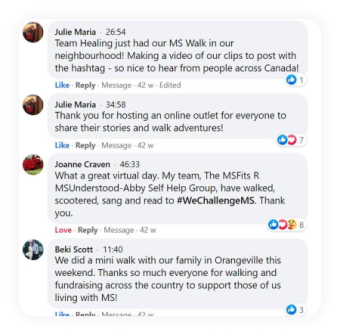2020 Impact Report
Connecting Our Community
WHO WE ARE
Our Vision
A world free of multiple sclerosis.
Our Mission
To connect and empower the MS community to create positive change.
Message from CEO
President and Chief Executive Officer
2020 was a year like no other. As COVID-19 quickly changed how we work, live and interact, it was clear that we needed to lean on each other to find the determination, strength and resiliency to face this new unknown.
We soon saw what a critical role the MS Society of Canada plays in the national health system as COVID-19 significantly impacted the MS community across the country. Within the health charity sector, we observed a four-fold increase in Canadians seeking support services due to cancelled surgeries, appointments, and specialty care, just as charitable giving sharply dropped. The MS Society saw a 60 per cent decline in our two main revenue streams. We had to quickly shift our funding model, which had been traditionally reliant on in-person event fundraising.
In response, we adapted to become a more agile and flexible organization and found creative ways to meet the needs of people affected by MS. The result was new online programming and virtual events that generated a wide range of social connections, support and resources, while extending our reach across the country. In addition, we joined an unparalleled group effort with our global MS community partners to better understand COVID-related risk factors and how the pandemic was impacting our community. By connecting with countries around the world, we've been able to share data and collaborate on research initiatives quickly and effectively and in turn, have been able to provide much-needed advice and information, and help thousands navigate the challenges of MS and COVID-19.
What has become abundantly clear throughout the pandemic is the power of research. Scientists and clinicians play a vital role in asking and answering questions that are paramount to our health and well-being. Thanks to the generosity of our supporters, we have been able to maintain critical investment in MS research in 2020 without losing momentum. We are at a pivotal moment with breakthrough research solutions on the horizon that can impact everyone affected by this disease. Researchers are on the cusp of answering some game-changing questions, from advancements in available therapies and diagnostic imaging technologies to the potential for stem cells to repair damage caused by MS.
2020 also marked a pivotal time in the national and global movements to address systemic racism and injustice, which has revealed deep, long-standing racial and social inequities within our society and has brought equity, diversity, and inclusiveness to the forefront. At the MS Society, we serve all Canadians living with MS so listening to the voices of Black, Indigenous, Asian, and all people of colour is critical. We are having essential conversations to educate ourselves and ensure there is meaningful change going forward as we amplify diverse voices from across the country.
The outpouring of assistance, guidance and compassion over the past year has been incredible and it has shown that times of crisis not only renew the certainty of our mission, but also strengthen our resolve. We are incredibly grateful for those who have given generously, from our dedicated volunteers, partners and board members to those who made financial gifts, participated in our events, and supported our COVID-19 Resiliency Fund. These are complex and challenging times, but I'm optimistic about our future. The tenacity of the MS community, the creativity of our funded researchers, and the exceptional support of donors like you have made an immeasurable difference. Together, we are stronger and better equipped to create a world free of MS.
2020 AT A GLANCE
$45,235,000* raised
(*combined Society & Foundation)
Leveraged $927,398
in funding
More than 56,837
meaningful connections
Bringing Together the MS Community
The importance of connection took on a new meaning in 2020 when we were suddenly required to stay apart.
We took this opportunity to find meaningful and creative ways to connect and unite the MS community across Canada. We were able to shift our events, programs and services online and for the first time ever, bring people together from across the country for virtual MS Walk, MS Bike, MS Connect and Savour.
"Loved the cooking at home experience, I felt connected to other members of the MS community for the first time during the pandemic. Looking forward to more of these in the future."
- Scott (Savour participant)
"I have been to the in-person MS Connect conferences several times and found this remote version even better. The online format meant that people across the country could participate together."
- Anonymous (MS Connect participant)
"Thank you for hosting an online outlet for everyone to share their stories and MS Walk adventures."
- Julie Maria (MS Walk participant)
"Going virtual this year and being part of the Facebook groups and seeing all of the posts on Instagram, it really feels like there's a whole country behind you. There are MS Bike riders everywhere and it's been fun to see what everyone is doing."
- Jan Laarman (Team PCL, MS Bike)
ADVANCE TREATMENT AND CARE
Having access to a variety of effective treatment and care options for symptom management, wellness and self-care will help people on their unique MS journey.
We support a broad portfolio of research that leads to better understanding and new and more effective treatments, we advocate for access to medicine, and provide programs and services that support those living with MS to live their fullest lives.
Understanding COVID-19 & MS
Knowledge on how COVID-19 affects people with MS is being captured in a global data-sharing initiative called COViMS (COVID-19 Infections in MS & Related Diseases), which is a joint effort by the Consortium of MS Centers, National MS Society USA, and MS Society of Canada.
This unparalleled collaboration with clinician-reported data being received from 18 countries, including Canada, seeks to understand the risks of COVID-19 in people with MS and whether disease-modifying therapies (DMTs) affect COVID-19 disease course or outcomes. Thanks to robust participation, this ongoing data collection demonstrates the game-changing benefits of aligning MS patient information on a global scale.
People living with MS are looking for peace of mind on the safety and effectiveness of two of the COVID-19 vaccines: Pfizer-BioNTech and Moderna.
Together with partner organizations, we convened a group of international expert researchers and medical professionals to review the available science and provide fact-based guidance.
Optimizing Treatment for Better Outcomes
The Canadian MS Working Group released an updated list of 16 recommendations on the optimal use of DMTs to provide guidance on starting, monitoring, and switching therapies to ensure that people are receiving the most optimum treatment. This information will help bring consistency to the treatment of MS across the country.
A pan-north American group led by researchers in Canada are identifying the Best Evidence-Based Strategies and Treatment/Therapies for Rehabilitation (MSBEST) to help healthcare professionals select evidence-based rehabilitation strategies for persons with MS.
Identifying Challenges to Accessing Treatments
Many Canadians living with MS cannot get sufficient, equitable or affordable access to DMTs as they face regulatory, administrative, and financial barriers, according to a Conference Board of Canada report supported by the MS Society.
The research found that improving access will benefit not only people living with MS, but also the healthcare systems across the country and the economy.
THREE ADDITIONAL DRUGS APPROVED AND THREE HEALTH CANADA SUBMISSIONS FILED
In the last year, treatment options for MS have grown from 15 DMTs to 17, including the first oral DMT for secondary progressive MS and a second therapy for NMOSD was approved. Three additional treatments have been submitted for review by Health Canada.
| Three additional drugs approved | Three Health Canada Submissions Filed |
|
|
BY THE NUMBERS
$2,827,607
invested in 15 research grants to advance treatment and care
10,918 individuals
supported through our programs
2 new partnerships
with TIME™ and NeuroSask to offer online rehabilitation and physiotherapy programs
ENHANCE WELL-BEING
We help remove physical and social barriers within communities to ensure access to opportunities and supports for people affected by MS.
Helping Change Policy - Our Advocacy Efforts Are Working Towards:
Increasing Employment Insurance (EI) sickness benefits from 15 weeks to at least 26 weeks of benefits by partnering with the Canadian Cancer Society and Canadian Labour Congress to share with policy decision-makers the findings of the Employment Insurance Sickness Benefit Policy 2019 Multi-Stakeholder roundtable report
Extending the length of compassionate care leave beyond the death of a loved one by up to three weeks by working with MP Matt Jeneroux, sponsor of the Private Members' Bill – C-220
BY THE NUMBERS
$11,000
invested in 1 research grant to advance well-being
1,581
Individuals accessed $628,313 in Quality of Life grants
92% success rate
for income support applications resulting in $1,380 - $1,685 a month in direct financial aid
5,100
Canadians wrote to their Member of Parliament in our fall #TakeActionForMS digital advocacy campaign.
$600
in one-time funding from the federal government in recognition of extraordinary expenses faced by people with disabilities during the pandemic.
UNDERSTAND AND HALT DISEASE PROGRESSION
Understanding the complexities of MS progression will help effectively stop MS in its tracks.
We continue to invest in research and support world-wide efforts to better understand how and why MS progresses.
Global Ties Accelerate Understanding of Disease Progression
As a founding partner and executive member of the International Progressive MS Alliance (Alliance), we're helping drive the research agenda in progressive MS with this global collaboration of MS organizations, researchers, healthcare professionals, pharmaceutical companies, trusts, foundations, donors, and people affected by MS. By working collectively across many disciplines, the Alliance can accelerate research in ways not possible by one country alone.
In 2020, an expert panel, convened by the Alliance, made recommendations on a biomarker known as neurofilament light (Nfl), an important component of nerve cells. Recent clinical trials have demonstrated that NfL levels are able to predict relapse rates, brain tissue loss, disability progression, and can be used to measure treatment response in both relapsing and progressive forms of MS. The panel proposed additional research and asked for drug regulators to recognize Nfl in order to begin clinical trials for new therapies.
Investing in Research to Understand and Halt Disease Progression
In 2020, 60 per cent of the MS Society's research portfolio targeted new ways to understand and halt disease progression. Here are a few examples of this incredible body of work:
REDUCING THE UNCERTAINTY OF MS
Research by a team at the University of Manitoba is investigating a protein called Neuregulin-1 beta 1 (Nrg-1β1), which is found in the body's neural cells. In earlier studies with mice, they discovered lower levels of the protein in those with MS and it continued to decrease as their symptoms worsened. This new work could help make it possible to detect MS much earlier, while also finding out if giving Nrg-1β1, which is already an approved drug in the U.S., would be an effective therapy to delay and potentially halt disease progression.
THERAPIES SUPPORTING REPAIR AND NEUROPROTECTION
The results of a phase 2 clinic trial of Bexarotene, a drug developed to treat cancer, confirmed it can repair myelin in people with relapsing MS, but the drug's side effects were too severe for clinical use. This trial provided a promising and important step forward in effectively assessing the efficacy of similar types of repair-focused therapeutics.
DIET AS A POSSIBLE TREATMENT TO SLOW PROGRESSION
Canadian and U.S. researchers have discovered that restricting dietary intake of methionine, an amino acid found in meat, fish, dairy products, and other foods, can slow disease onset and progression in mice with MS-like disease. If proven effective in humans, this type of dietary intervention could represent a cost-effective and low-risk measure to prevent and control MS.
BY THE NUMBERS
$2,304,432
invested in 32 research grants to understand and halt disease progression
618
participants recruited to the Canadian Prospective Cohort Study to Understand Progression in Multiple Sclerosis (CanProCo)
PREVENT MS
Stopping MS before it starts will reduce the number of people who develop the disease.
We continue to invest in research that examines the factors that could lead to MS and how people might shape their lives to reduce their risk of getting the disease.
Understanding the Earliest Signs of MS
There is growing evidence that a prodromal phase in MS – early non-specific signs and symptoms – may occur 5-10 years or more before clinical recognition of MS.
Understanding the MS prodrome will help discover ways to stop the disease before onset of typical clinical symptoms of MS. This year we invested in a research study lead by Dr. Helen Tremlett to investigate the MS prodromal period. The study focuses on better understanding the risk factors leading to the development of MS, in addition to identifying the earliest signs of MS.
BY THE NUMBERS
$370,000
invested in 5 research grant to prevent MS
FINANCIAL HIGHLIGHTS
OF THE $45,235,000* RAISED IN 2020:
$26,331,000 (58%) funded life-saving research, programs and advocacy
$16,394,000 (36%) invested in community fundraising activities
$4,173,000 (9%) went towards administration
(*combined Society & Foundation)
View the full financial report
THANK YOU
Thank you for helping us confront COVID-19 head-on and safeguard our important mission. Together, we are connecting and empowering the MS community to create positive change.


